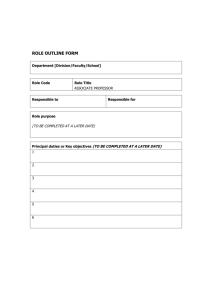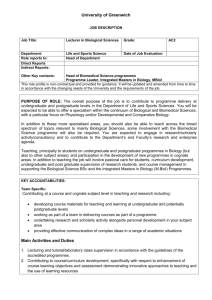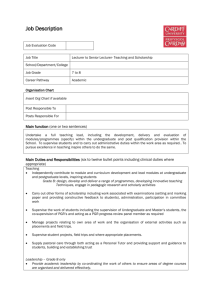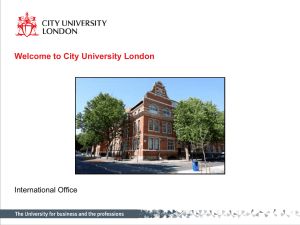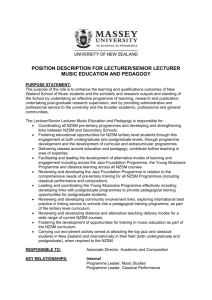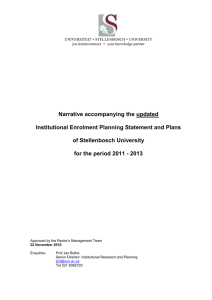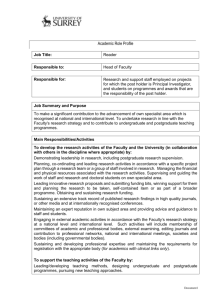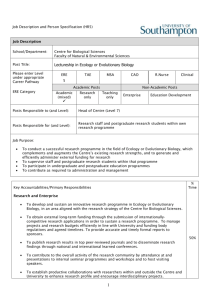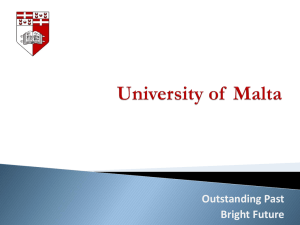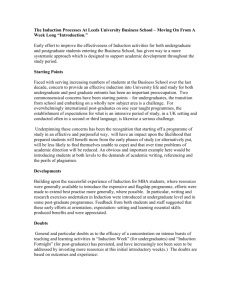Nottingham University - Jobs
advertisement
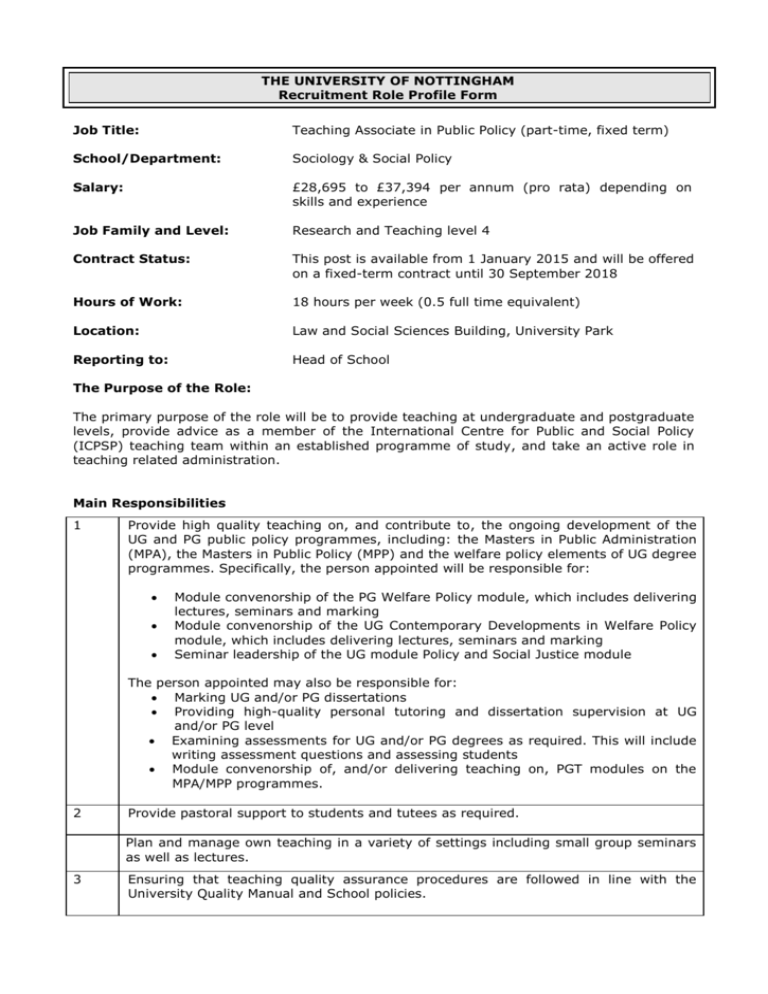
THE UNIVERSITY OF NOTTINGHAM Recruitment Role Profile Form Job Title: Teaching Associate in Public Policy (part-time, fixed term) School/Department: Sociology & Social Policy Salary: £28,695 to £37,394 per annum (pro rata) depending on skills and experience Job Family and Level: Research and Teaching level 4 Contract Status: This post is available from 1 January 2015 and will be offered on a fixed-term contract until 30 September 2018 Hours of Work: 18 hours per week (0.5 full time equivalent) Location: Law and Social Sciences Building, University Park Reporting to: Head of School The Purpose of the Role: The primary purpose of the role will be to provide teaching at undergraduate and postgraduate levels, provide advice as a member of the International Centre for Public and Social Policy (ICPSP) teaching team within an established programme of study, and take an active role in teaching related administration. Main Responsibilities 1 Provide high quality teaching on, and contribute to, the ongoing development of the UG and PG public policy programmes, including: the Masters in Public Administration (MPA), the Masters in Public Policy (MPP) and the welfare policy elements of UG degree programmes. Specifically, the person appointed will be responsible for: Module convenorship of the PG Welfare Policy module, which includes delivering lectures, seminars and marking Module convenorship of the UG Contemporary Developments in Welfare Policy module, which includes delivering lectures, seminars and marking Seminar leadership of the UG module Policy and Social Justice module The person appointed may also be responsible for: Marking UG and/or PG dissertations Providing high-quality personal tutoring and dissertation supervision at UG and/or PG level Examining assessments for UG and/or PG degrees as required. This will include writing assessment questions and assessing students Module convenorship of, and/or delivering teaching on, PGT modules on the MPA/MPP programmes. 2 Provide pastoral support to students and tutees as required. Plan and manage own teaching in a variety of settings including small group seminars as well as lectures. 3 Ensuring that teaching quality assurance procedures are followed in line with the University Quality Manual and School policies. 4 Make a significant contribution to the success of the School, including: undertaking an administrative role and/or the administrative management of specific initiatives, attending school meetings and contributing to relevant teaching teams. 5 Maintaining the currency of teaching material and content through engagement with research in relevant subject areas. 6 Contribute to the planning, design and development of degree programmes and modules at undergraduate and postgraduate level. 7 Any other duties appropriate to the level and role of the post holder. Knowledge, Skills, Qualifications & Experience Essential Qualifications/ Education Knowledge/ Skills/Training Have or be close to completing a PhD in a related subject Proven track record of high quality teaching to undergraduate and/or postgraduate students. Knowledge to deliver (primarily teamtaught) public policy programmes to undergraduate and/or postgraduate students. Ability to contribute significantly to the administration of the School’s teaching activities. Ability to creatively apply relevant approaches to teaching and learning support. Desirable Higher Education teaching qualification (or working towards) Higher Education Academy Associate or Fellow status or equivalent Ability to teach module on Managing People Skills in: Teaching small and very large groups of students Excellent oral and written communication skills, including the ability to communicate with clarity on complex information Time-management and organisation Completing administrative duties effectively and on time Working as a team player in an interdisciplinary environment Experience Experience of designing and delivering teaching and assessment to undergraduate and/or postgraduate students in public and social policy. Experience of undertaking teaching related administration. Experience of working with a virtual learning environment such a Moodle to support student learning Applicants will be considered on an equal basis, subject to the relevant permission to work in the UK as defined by the requirements set out by the UK Border and Immigration. Informal enquiries may be addressed to Professor Bruce Stafford at bruce.stafford@nottingham.ac.uk. Please note that applications sent directly to this email address will not be accepted. Decision Making: i) Taken independently by the role holder; Planning teaching programme and direction Making individual/team decisions about design and conduct of specified modules Teaching and guidance of students Setting and marking of assignments and exam papers ii) Taken in collaboration with others; Aspects of course/curriculum development and new programmes of study Ensure academic and administrative quality of courses iii) Referred to the appropriate line manager by the role holder; • • Complex pastoral issues Disciplinary/grievance procedures School of Sociology and Social Policy We are a multidisciplinary unit comprised of 33 research active teaching staff and 13 administrative staff. The School is led by the Head of School, Professor Bruce Stafford and the School Executive Group, supported by a series of administrative teams, including Teaching and Research teams. Regular School Meetings, attended by all staff, play a central role in ensuring a collegial approach to the development of policy and practice within the School. Members of the School are closely involved in the national and international scholarly community and many have international reputations in their fields. Research funding has been secured from a range of sources including ESRC, EPSRC, ESF, EU, Leverhulme, Nuffield, the Community Fund and the Ford Foundation as well as government departments, local authorities and charities. The School encourages intellectual curiosity, original thought and engagement with outside organisations. It seeks to exploit the synergy which arises from the School’s multidisciplinary and the interface between the disciplines and applied research and policy making, while also valuing and encouraging theory-driven research and scholarship. The School’s research groups (Institute for Science and Society; Health and Social Care; Identity, Citizenship, Equalities and Migration; International Centre for Public and Social Policy) provide a focus and stimulus for multidisciplinary research activity and collaboration across the School. The School is closely involved with the Institute for Mental Health, including the Collaboration for Leadership in Applied Health Research and Care (CLAHRC) and the Centre for Social Research in Health and Health Care. The School and the University provide extensive organisational and financial support for research. Each member of research-active staff can hold a personal research account and research project overheads are returned to grant-holders after deduction of central and local costs. All staff receive an annual contribution towards research costs and UK conference expenses and additional support for overseas conference attendance and international networking activities is available. Strategic funds are awarded to pump-prime research development activities, particularly those likely to attract significant external funding. The Director of Research provides regular digests of information about current funding opportunities and relevant external conferences and seminars. Expert support and assistance in the preparation of funding applications is provided by both academic mentors and administrative colleagues. Weekly research seminars offer opportunities for staff and research students to share in and contribute to colleagues’ work in progress and to enjoy presentations from external speakers of national and international standing. The School teaches 492 undergraduate students on single honours undergraduate programmes in Sociology and Social Work and joint honours programmes in Sociology, Criminology and Social Policy. 182 students are registered for postgraduate taught programmes in Research Methods (ESRC recognised), Global Citizenship, Identities and Human Rights, International Social Policy, Social Work, Public Policy and Public Administration. The University is recognised as an ESRC Doctoral Training Centre and the School plays a central role in the provision of research methods training. The School’s 66 full and part-time postgraduate research students make a very significant contribution to the School’s research culture. Studentships have been secured from a range of funders including ESRC (including CASE), MRC, ESRC/ MRC, CIHR, ORS, government departments and charities. Joint supervision of research students offers early career staff the opportunity to gain skills in effective supervision by working alongside more experienced colleagues. Both the University and the School are strongly committed to staff development through mentoring, training, appraisal and there are excellent prospects for career advancement. School of Sociology and Social Policy
